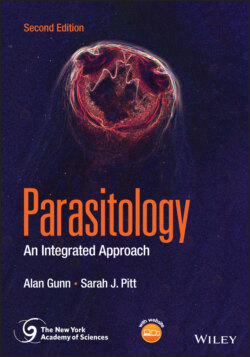Читать книгу Parasitology - Alan Gunn - Страница 120
4.3.1 Genus Prototheca
ОглавлениеMembers of this genus are closely related to the well‐known alga Chlorella, but they lack chloroplasts, and most species survive as saprophytes feeding on dead organic matter in a similar manner to free‐living fungi. They are found throughout the world and can be isolated from the soil, slime, sludge, gut contents, faeces, marine and freshwater, swimming pools, and virtually anywhere which has high organic matter content (Kano 2020). Some species are facultative parasites that infect various animal species with consequences that range from mild disease to fatalities. Prototheca wickerhamii and Prototheca zopfii are responsible for most human infections. These are usually associated with patients who are immunocompromised through disease (e.g., HIV infection) or medical treatment (e.g., chemotherapy/ corticosteroid therapy). A new species, Prototheca cutis, was described from a patient in Japan (Satoh et al. 2010) and further species will probably be discovered in the future now that the genus is receiving more attention. In 2018, an outbreak occurred in a cancer chemotherapy unit in India that resulted in 12 patients becoming infected with P. wickerhamii (Khan et al. 2018).
The algae gain entry to the body via the skin – usually through an existing wound – and cause a localised cutaneous infection. This often manifests as dermatitis with the formation of pustules, ulcers, and erythematous plaques. Occasionally, the infection becomes disseminated throughout the body and causes potentially fatal meningitis (Joerger et al. 2020).
There are isolated but increasing case reports of dogs and cats suffering from illnesses caused by Prototheca. These often take the form of gastrointestinal infections that cause diarrhoea, but they can become disseminated elsewhere in the body with often fatal results. In cows, P. wickerhamii, P. zopfii, and Prototheca blaschkeae are responsible for sporadic cases of mastitis in many parts of the world. Protothecosis is not a commonly recognised cause of mastitis, and therefore, it often remains undiagnosed because vets do not think to test for it. This can cause problems because the algae do not respond to normal treatments for mastitis. Indeed, at the time of writing, there was no effective treatment available. Consequently, the course of the disease can be prolonged, and there is a potential for severe economic losses in dairy herds (Jagielski et al. 2019).
